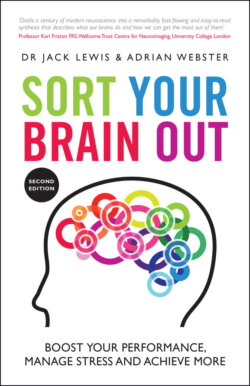Читать книгу Sort Your Brain Out - Джек Льюис, Адриан Вебстер - Страница 15
The power of imagination
ОглавлениеNumerous experiments have been carried out over the years with people practising new skills, varying from shooting basketballs to playing the piano. What's come to light is that – whether or not someone actually physically practises a skill or instead vividly pictures the process of doing it – after only a few days, marked functional changes happen in the brain. Incredibly, changes in those who had only imagined practising were almost as significant as those who had practised for real!
That the brain learns to learn throughout childhood is, admittedly, an odd concept to get your head around. As well as having to learn the very basics such as walking and talking in our first couple of years there was just so much to learn before we even got anywhere near stepping through the school gates – at which point intense learning became the “normal” state of affairs, both in the playground and the classroom, as we were regularly confronted with and tested by situations that took us out of our comfort zone. This happened not just in lessons, but also outside of formal learning times, as we navigated the twists and turns of learning how to get on with other people in all aspects of life. It could have been when practising sports skills, trying to work out the unfathomable rules of attraction or negotiating our way through daily social exchanges with family, friends, strangers and those regarded as arch enemies. Feeling out of your depth at that stage in life might not be particularly pleasant, but it's nonetheless a familiar, if not daily, occurrence. And it's relatively easy to deal with when everybody else is in the same boat.
In adulthood, however, we have more freedom of choice and can exert much more free will over what we will and will not spend our time doing. Not surprisingly this means that we tend to gravitate towards activities that we are good at, enjoy doing or at least remain squarely within our comfort zone; “set‐pieces” that through repetition have become so well known to our brains that we barely register how we're doing whatever we're doing.
Unfortunately, this means we become more and more unfamiliar with the feeling of struggling to grasp a new idea or skill. Out of practice in dealing with such feelings, we either don't engage with it fully or try to dodge it entirely. It's human nature to be drawn towards activities that increase our sense of well‐being and to be repelled by those that decrease it. Alas, in doing this, we inevitably turn ourselves into set‐piece specialists. In fact, most people spend their entire adult lives doing things they have done many times before because those activities can be done with the least amount of cognitive effort and the smallest possibility of generating feelings of inadequacy.
We like to operate on autopilot because it's less hassle, less stressful and tends to reduce anxiety. The problem is that the easiest route in the short term is rarely the best path in the long run. And if there's one weakness that we humans often fall foul of, it's our tendency to choose the immediate, easy reward and worry about any long‐term drawbacks later (or better still, never).
